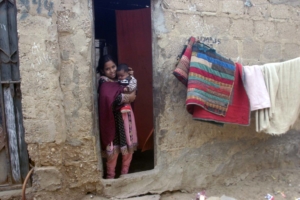The Cycle of Poverty
 Poverty is a complex, multidimensional topic that has many factors. Different aspects of poverty affect each other and oftentimes continue to reinforce the negative aspects. The cycle of poverty is perpetuated by so many factors: poor health and education outcomes, not enough capital, vulnerability to life changes and lacking a voice to participate in society.
Poverty is a complex, multidimensional topic that has many factors. Different aspects of poverty affect each other and oftentimes continue to reinforce the negative aspects. The cycle of poverty is perpetuated by so many factors: poor health and education outcomes, not enough capital, vulnerability to life changes and lacking a voice to participate in society.
First, health is important not only because it prolongs one’s lifespan, but also because it directly affects one’s income earning potential. It gives people the energy to focus on activities that can contribute to a higher earning potential such as school work, running the business or farming. With a higher income, people can move on from subsistence living and onto a life of purchasing goods they are interested.
Second, education is important because it teaches one to make wise health decisions, that will ultimately contribute to a better health outcomes and eventually higher incomes. The cycle of poverty is often perpetuated because there is a direct lack in education. For instance, people will not use clean sanitation practices have a higher chance of getting inflicted with a disease such as diarrhea or dysentery. Having a sickly body will prevent a child from attending primary school, for oftentimes they need to walk several miles. Instead of walking with a body in that kind of state, a child will most likely stay home, perpetuating the cycle of poverty.
Next, consumption is indicated by how much purchasing power people have, whether they buy food for sustenance or other material goods for pleasure. Consumption is dependent on the amount of income. However, higher income is not necessarily practical to measure because money has different purchasing power and prices are always changing.
Vulnerabilities refers to the level of risk that a household or individual is likely to experience an episode of health or income poverty over a given time. The more vulnerable a person is, the greater their chances of being affected by any number of risks, including violence, natural disasters and quitting school (whether due to no money to pay for tuition or too ill to attend classes). It is likely that the more vulnerable people are, the less cushion they have to recover quickly.
Lastly, giving a voice to the poor and ability to participate in society is vital to lifting them out of a cycle of poverty. Hearing their concerns allows us to pinpoint their needs and help them reach the health and education levels necessary to thrive.
According to Nobel Laureate Amartya Sen, an important aspect of addressing poverty is to allow people to expand their capabilities to do what they want, simply because doing what one wants holds value in it of itself. So whether a woman or man wants to live farming for the rest of his life or pursue a medical degree, all those have value. All they need is agency, which is the opportunity available for them to pursue their life path.
Efforts that help the poor reach higher health, education and income levels, or protect them from their vulnerabilities or give them a voice are all vital dimensions in ending the cycle of poverty.
– Christina Cho
Sources: Stanford University, World Bank
Photo: Flickr
